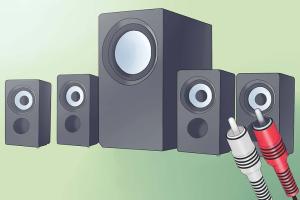Ultimate Guide: Connecting Cable TV to a Projector for Optimal Viewing

-
Quick Links:
- Introduction
- Understanding Projector Types
- Equipment Needed
- Step-by-Step Guide
- Troubleshooting Common Issues
- Case Studies and Real-World Examples
- Expert Insights
- FAQs
Introduction
Connecting cable TV to a projector can elevate your viewing experience, whether for movie nights, sports events, or even professional presentations. With advancements in technology, the process has become simpler, allowing for high-quality visuals and sound. In this guide, we will explore the various methods to connect your cable TV to a projector, ensuring that you get the best out of your multimedia setup.
Understanding Projector Types
Before diving into the connection process, it's essential to understand the different types of projectors available on the market:
- DLP (Digital Light Processing): Known for their brightness and sharp images, DLP projectors are ideal for well-lit rooms.
- LCD (Liquid Crystal Display): These projectors provide vibrant colors and are generally more affordable.
- LED: Compact and energy-efficient, LED projectors are perfect for portable options.
- Laser: Offering high brightness and longevity, laser projectors are suitable for professional use.
Equipment Needed
To connect your cable TV to a projector, you'll require specific equipment:
- Projector with compatible input ports (HDMI, VGA, etc.)
- Cable TV box or receiver
- HDMI or VGA cable (depending on your projector's input)
- Audio cables (if not using HDMI)
- Remote control for the projector
- Power source for both projector and cable box
Step-by-Step Guide
Now that you have all the necessary equipment, follow these steps to connect your cable TV to a projector:
Step 1: Gather Your Equipment
Ensure that all required equipment is available and functional. Check the cables for any wear and tear.
Step 2: Identify Input Ports
Inspect both your projector and cable box to determine which input ports are available. Most modern projectors will have HDMI ports.
Step 3: Connect the Cables
Using the appropriate cable, connect your cable TV box to the projector:
- If using HDMI, plug one end into the HDMI OUT port of the cable box and the other end into the HDMI IN port of the projector.
- If using VGA, connect the VGA cable similarly and use audio cables for sound.
Step 4: Power On Devices
Turn on both the cable TV box and the projector. Ensure that the projector is set to the correct input source.
Step 5: Adjust Settings
Use the projector remote to adjust settings such as resolution, brightness, and sound levels for optimal viewing.
Troubleshooting Common Issues
If you encounter issues while connecting your cable TV to the projector, consider the following troubleshooting tips:
- No Signal: Double-check all cable connections and ensure the projector is on the correct input source.
- Poor Picture Quality: Adjust the resolution settings on your cable box or projector.
- Audio Issues: Ensure that audio cables are connected properly, and check the volume settings.
Case Studies and Real-World Examples
To illustrate the effectiveness of connecting cable TV to a projector, let's consider two case studies:
Case Study 1: Family Movie Night
A family decided to use a projector for their weekly movie night. They connected their cable TV box to a DLP projector via HDMI. The result was a cinematic experience with vibrant colors on a large screen, enhancing their family bonding time.
Case Study 2: Corporate Presentation
A small business used a projector for a corporate presentation. By connecting the cable TV box, they were able to showcase live news updates during a meeting. This seamless integration of cable TV into their presentation added real-time data and enhanced engagement with the audience.
Expert Insights
Experts recommend considering the environment when setting up your projector. Factors like room size, ambient light, and seating arrangements can impact your viewing experience. Additionally, investing in quality cables can prevent signal loss and enhance picture quality.
FAQs
FAQs
1. Can I connect any projector to my cable TV?
Most projectors can connect to cable TV as long as they have compatible input ports.
2. What if my projector doesn't have an HDMI port?
You can use a VGA connection with audio cables, or consider an HDMI to VGA adapter.
3. Do I need special cables for sound?
HDMI carries both video and audio. If using VGA, you’ll need separate audio cables.
4. Will the projector work in bright rooms?
Some projectors are better suited for bright environments, such as DLP models.
5. How do I change the input source on my projector?
Use the remote control or onboard buttons to select the correct input source.
6. Is there a way to stream cable TV to my projector wirelessly?
Yes, you can use devices like Chromecast or Apple TV for wireless streaming.
7. Can I use my projector for gaming too?
Yes, as long as the projector has the appropriate input connections for your gaming console.
8. What should I do if the projector doesn't turn on?
Check the power source, ensure the lamp is functional, and consult the user manual.
9. How can I improve the picture quality on my projector?
Adjust the resolution settings, focus, and brightness levels on the projector.
10. Are there any specific projectors recommended for cable TV?
Look for projectors with high lumens and good contrast ratios, such as those from brands like Epson or BenQ.
Random Reads
- Why whatsapp contact names change automatically
- How to truncate text in excel
- How to troubleshoot computer startup problems
- How to type gps coordinates into google maps
- How to unlock an oven
- How to unlock bosch oven
- How to unlock a safe
- How to uninstall riot games client vanguard
- How to share location android to iphone
- How to share whatsapp contact